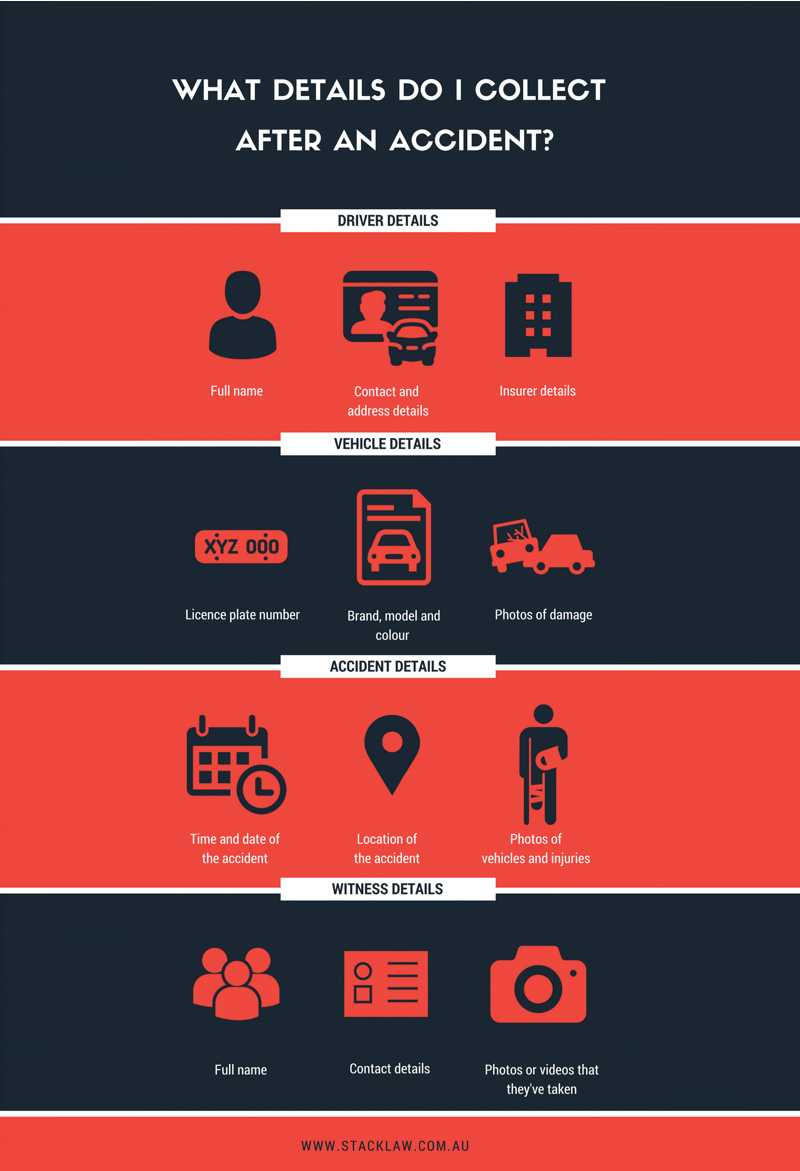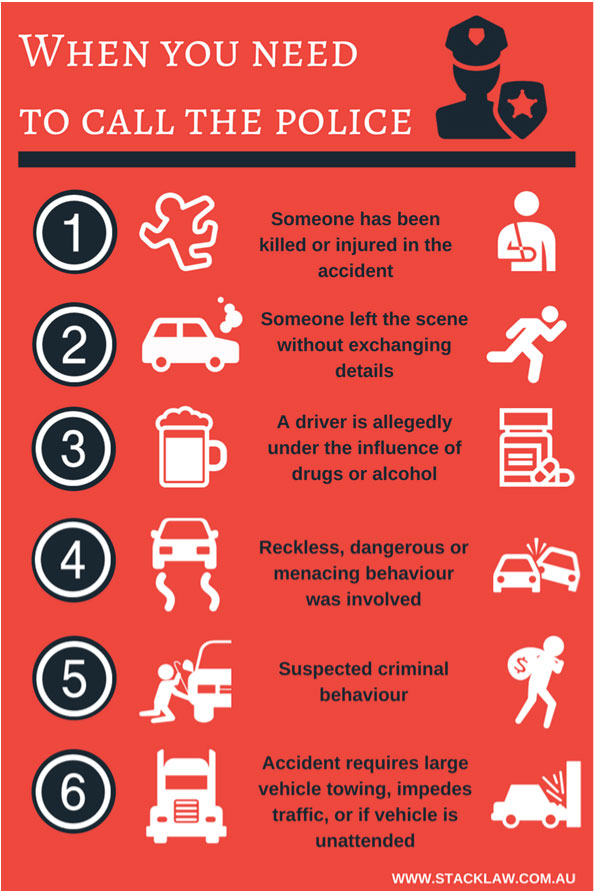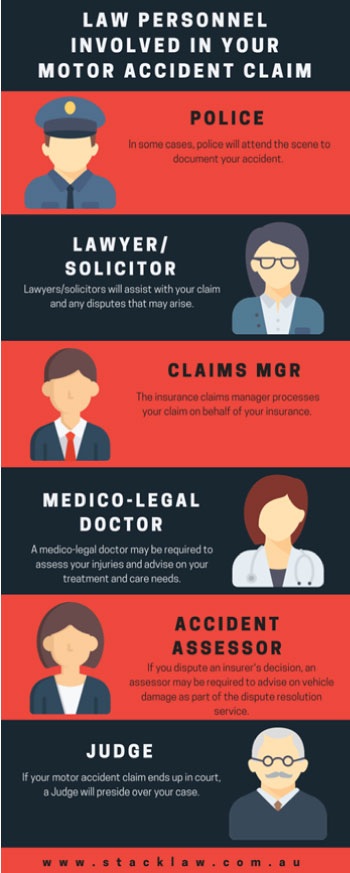Now that we've covered the changes to motor accident law, it's time to go through the practical processes you should follow if you are involved in a motor accident.
Ask an expert
Will I have to go to court?
What are the time limits?
What is the value of my claim?
While there are many safety tips that we would advise for your personal wellbeing, from a legal perspective there are several important steps that you will need to take to ensure that the matter can be resolved as quickly and beneficially as possible.
| Step #1 Stay calm |
|
The first thing to remember when you've been in a motor accident is to try to remain calm. Acting angrily or aggressively towards the other driver(s) will not only increase the effects of stress, shock and panic for you and the other parties, but it could lead to serious criminal charges, additional injuries and unnecessary difficulties. Furthermore, you could find yourself in shock and/or full of adrenaline, which can make it difficult to remain focused on protecting yourself both physically and legally. |
| Step #2 Check for injuries |
| Check on the occupants of your vehicle to see if anyone has sustained injuries and, if so, whether they require urgent medical attention. If you, your passengers, or occupants of the other vehicles involved do require medical assistance, it is critical that you dial 000 for an ambulance immediately. |
| Step #3 Survey the damage |
|
If you are able to vacate your vehicle, then you will need to assess the severity of the damage to your vehicle and to any of the other vehicles involved in the accident. If the damage is significant, you will need to contact the police who will come to document the accident and talk to the involved parties and witnesses. It may be a good idea to take photographs of the damage to your vehicle and the other vehicle for insurance purposes and even to take photographs of the general area and where the vehicles are positioned if possible. |
| Step #4 Fault |
| Fault is determined not by the driver(s), but by the authorities like the police and the courts after careful review of all the circumstances surrounding the accident and by following proper legal procedures. |
Ask an expert
What do I have to do?
Is there anything I should do now?
What happens when a claim doesn't go to plan?
Immediately after an accident

Immediately following the crash and the assessment of injury and damage, you will need to collect information on the other driver(s) and document the accident through photos. Luckily, smartphones have made this process very simple. Here is what you should try to collect:
Contact details of the other driver(s) including:
- Full name
- Full address
- Contact number, including mobile, home and work if appropriate
- Details of their insurer
Vehicle details including:
- Make and model of the vehicle
- Licence plate
- Vehicle colour
Details of the accident including:
- Time the accident occurred
- Date the accident occurred
- Exact location of the crash (You can use Google Maps on your smartphone to pinpoint this if necessary).
- Photos of the accident: Focus particularly on the areas of damage on all vehicles involved, with plenty of close-up images and angles, as well as shots that are further away showing where the vehicles have ended up
Details of any witnesses including:
- Full name
- Contact details
Please note that if police are involved, they will record these details as well, and some people may prefer just to share their details with police. If this is the case, it's important to ensure you check that everything is recorded with the police.
When to report the accident to police

The NSW police have "Major Traffic Crash" criteria that are used to determine whether or not they need to attend a motor accident.
- Someone has been killed or injured
If anyone involved in the accident has been injured, or worse, killed, the police must attend the scene.
- One or more of the parties left the scene without
exchanging details
Referred to as "particulars" by the police - failure to stop and exchange the details (listed above) is another reason for a police presence to be requested. In this event, they will need to speak to you and any witnesses to record as many details of the incident as possible, which hopefully will lead them to track down the other parties.
If there is an altercation between drivers stemming from an unwillingness to swap details, then the police should be contacted to resolve the matter. - A driver is allegedly under the influence of drugs or
alcohol
If you believe that the driver of the other vehicle is intoxicated by either alcohol, drugs or both, it's important that the police be contacted. Remember to remain calm in this situation, as any aggression or anger shown towards someone who is intoxicated could pose a risk to your own safety and the safety of those around you. The police are trained and capable of handling the situation.
Other instances that involve police contact
Aside from the major traffic crash criteria, there are other situations that require discussion with NSW police. In many of these cases, the police will be able to advise you of whether they will need to attend the site of the accident, or if any further action is to be taken.
Accidents involving reckless, dangerous or menacing behaviour
If you believe that the accident, even a minor one, was caused by the other driver(s) driving in a manner that was reckless, dangerous or menacing (with or without alleged intoxication), then reporting to police should be a priority.
Suspected criminal behaviour
If there is suspected criminal behaviour at the scene of your car accident, then police should be called. This could include:
- Aggressive behaviour towards you or witnesses
- A suspected underage driver
- A suspected unregistered vehicle
- Suspected intoxication
- Other suspicious activities witnessed
Unattended vehicles and property damage
If you are involved in an accident and unable to trade details with the owner of a vehicle or property, contact the police. They will be able to assist you in recording the incident and finding the owner of the damaged vehicle or property to resolve the matter.
Traffic hazards and large vehicle towing
The police are also required to attend if your motor accident impedes traffic to the extent that traffic management or direction are required to return traffic flow to a normal state. This may include any substances or fluids that have been spilled onto the road as a result of the incident.
If the accident involves a truck, bus or other heavy vehicle, then the police are to be notified so that specialist towing or support equipment can be arranged.
Accessing the police report
If the police are involved in your motor accident claim, then they will record the details of the accident and provide you with an "event number". This number can be used to request the police report on your accident.
You, your legal counsel, or your insurer can request your incident report via the Insurance Services Unit or by downloading the 'P862 Application for Incident Report' form.
Blameless accidents
A motor accident is deemed blameless when its cause cannot be directly attributed to the operational failure of the motor vehicle(s) by their driver(s). In other words, if the accident is caused by an external factor not influenced by either driver, then neither driver can be blamed.
An example of a blameless accident could be when one driver suffers a heart attack that causes them to crash into another vehicle.
Hit and run
A "hit and run" is when the driver(s) of one or more of the vehicles involved in the accident depart the scene without swapping any details. In this event, you must contact the police, report the accident and explain the situation. They will advise on the next steps involved, but they will usually attend the scene, speak to any witnesses and record the details of the accident with you.
Who else do I contact?
Aside from the relevant emergency services, there are other parties that you will want to contact, depending on the severity of the damage and extent of injury.
If the accident is minor, no vehicles require towing, nobody is injured and both parties have swapped details, then there is no need to contact the police.
Towing services
If the damage to a vehicle requires it to be towed from the scene, then you will need to report the accident to the Police Assistance Line. You'll receive an incident report number to use for the duration of your insurance claim and legal proceedings, if applicable.
Medical

If you or a passenger are injured in the accident, but do not need to be taken to hospital, you should go to a medical centre or your GP as soon as possible in order to record your injuries formally.
Your doctor will provide you with a medical certificate and a report that details all injuries caused by the accident, along with any treatment that is required to heal those injuries.
Mechanic
Should your car be damaged, but drivable, you will want to take it to your local (or insurer approved) mechanic so they can provide you with a formal damage report that you can use for your insurance claim and legal proceedings, if applicable.
Manufacturers of objects in your vehicle
In order to assess damages accurately, you may be required by your insurer to have any goods that were inside your car and damaged during the accident to be valued by the manufacturer or a relevant store.
This process will be largely dictated by your insurer. It is important that you comply with their requests to ensure you receive the maximum benefits.

Pedestrians
What happens when you're a pedestrian involved in an accident
If you're in the unenviable position of being struck by a motor vehicle, then it's important to understand the process following the incident.
Process
When the accident occurs
If you're not severely injured, then you'll need to follow similar steps to that of a motor vs. motor accident. That means:
You must trade the following information with the driver of the vehicle:
- Contact details including: full name, address and phone numbers
- Insurance information
- Vehicle details: licence plate, make, model and colour of vehicle
- Details of the accident: time and date of the accident, location of the accident
- Photos of the accident and any injuries: pictures of the car, including the number plate, any injuries you've received
- If possible, get the details of any witnesses
Minor injury
If you've endured a minor injury, meaning that you do not require immediate medical assistance like an ambulance or hospital visit, then it's important for you to follow the above instructions to record the details of the driver(s) and the incident.
You should still visit your GP so that your injuries can be recorded officially for the purpose of any possible insurance claim and any legal proceedings, if applicable.
Severe injury
If you are severely injured due to the accident, you'll likely be taken to the nearest hospital for treatment. In your absence, police will have been called to attend and record the accident. At this stage, there is of course very little you can do.
Your injuries will be recorded at the hospital for your insurance and any legal proceedings, and the police will be able to provide you with the incident report.
Does the type of vehicle matter?
The meaning of a motor vehicle (for claims purposes) is a vehicle that is built to be propelled by a motor that forms part of the vehicle. It can include motorbikes, buses, trucks, trailers, and construction vehicles.
There is no difference in the claims process provided the vehicle is a "motor vehicle". Also, you can claim if you were a pedestrian or cyclist, as long as a motor vehicle was involved.
Large vehicles
Trucks, buses, and other large vehicles almost always require the assistance of police, as they are normally an impediment to traffic and require a level of signalling and traffic control to clear the scene.
If no traffic management is required and damage is minimal, follow the same steps as detailed above, ensuring to swap all driver details and take photographs.

Motor accident laws for tourists in Australia
If you are a tourist or a non-permanent resident and are involved in a motor accident in Australia, you are still covered by Australian law while you remain in the country.
It's important to note, however, that once you leave Australia, you do not continue to receive statutory benefits.
Should you require continuing healthcare, then you need to follow the laws in place in your country of origin. Your paperwork, including incident reports and medical certificates, can be used as evidence for your local governing bodies.
Different states
States in Australia have different laws relating to motor accidents. This guide covers the changes to the laws in NSW only. If you are in a motor accident in another state, your claims and benefits are governed by that state's laws.
For example, if you are a NSW resident and have a motor accident in Queensland, the incident is covered under Queensland law, not NSW law.
Law personnel involved in motor accidents
Police
The police will attend the motor accident scene if it meets their criteria. They will talk to those involved, including witnesses, and will officially document the incident. You can use this report for your claim.
Lawyer (solicitors) and support staff
You may need to seek advice from a lawyer (solicitor) in regard to your claim. They can assist you in dealing with disputes that arise concerning your statutory benefits and/or in claiming damages.
Barrister
Sometimes your lawyer will engage a barrister on your behalf when presenting your case to the Dispute Resolution Service. If your matter proceeds to court, then your lawyer would engage a barrister to present your case in court.
Insurance claims manager
The insurance claims manager is the person who will handle your motor accident insurance claim. It's their job to help you process your claim.
Medico-legal doctors
At various points during your claim you may be required to attend a medico-legal doctor to assess your injuries, your treatment and care needs and/or your whole person impairment. You may be required to attend a medico-legal doctor for the insurer, for your lawyer and for the Dispute Resolution Service.
Motor accident assessors in the Dispute Resolution Service
If you dispute an insurer's decision with the Dispute Resolution Service, or you refer your damages claim for assessment by the Dispute Resolution Service, then an assessor will be allocated to your matter to make a decision or assessment about those matters in dispute.
Judge
While most claims don't end up in court, if you do commence court proceedings then your case will eventually be heard by a judge who will determine your case.

Stacks Law Firm motor accident claims and advice
Stacks Law Firm has many lawyers who are personal injury and motor accident law specialists, including Accredited Specialists in Personal Injury law. With a network of lawyers around NSW, we're focused on ensuring that you have access to high quality and cost effective legal advice to help you resolve your case.
If you need further advice on motor accident laws and how they affect you, or if you believe that you are entitled to damages or other benefits, then be sure to get in touch with us and we'll direct you to your nearest specialist.
Erin Woodward
Motor vehicle accidents
Stacks Law Firm
The content of this article is intended to provide a general guide to the subject matter. Specialist advice should be sought about your specific circumstances.

